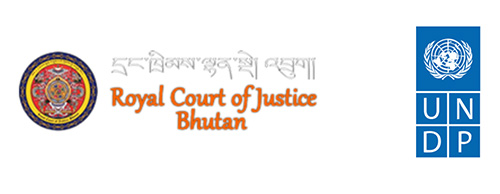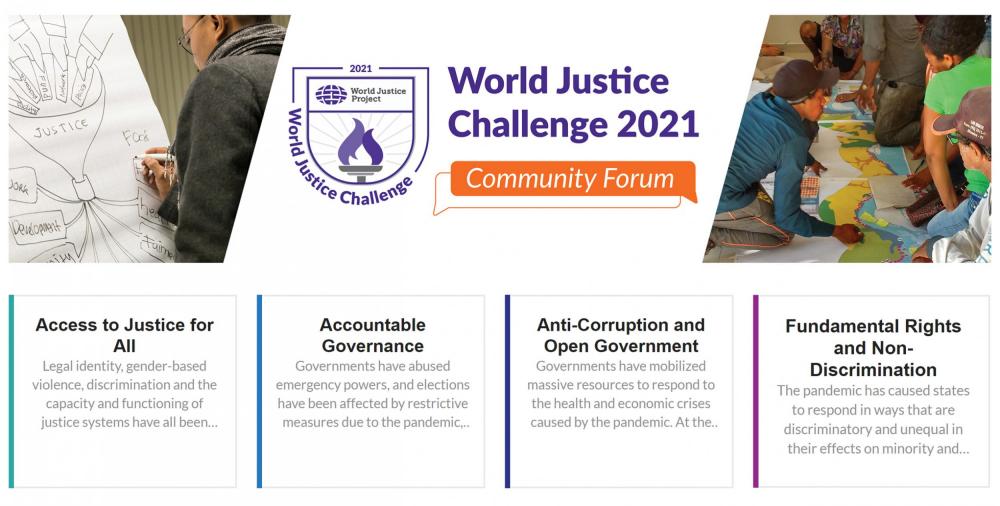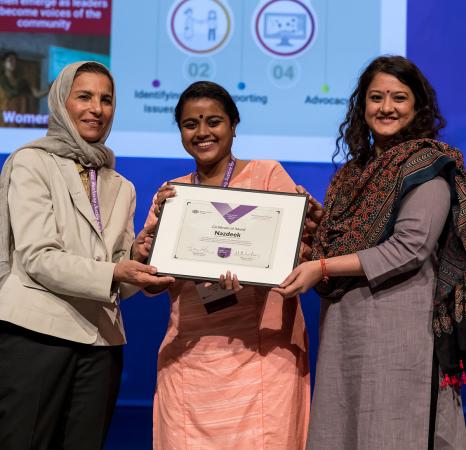Project Pitch and Q&A
Watch UNDP Bhutan's World Justice Challenge project pitch and join WJP's World Justice Challenge 2021 Community Forum to ask questions to project representatives, explore additional resources, meet new colleagues, and more. Join the discussion and help us build stronger rule of law values, institutions, and communities around the world.
Ask your question at the Community Forum
Project Summary
The Judiciary of Bhutan initiated an e-litigation project in 2020 as part of their Response to the COVID-19 pandemic to ensure continued justice delivery to citizens. The pilot developed the e-litigation Rules and Regulations, provided video conferencing equipment to 14 courts, and developed an e-litigation web portal and trained service providers and users on how to use these facilities. The proposed project will provide a platform for integration of the Community Centers to the e-litigation portal.
At present, the Community Centers provide one stop services to the community, and 92 of these centers are equipped with video conferencing capabilities.
Problem Statement
Access to justice services have always been one of the challenges in Bhutan due to the country's demanding geographical terrain and sparsely distributed population. Due to this challenge, people's willingness to seek recourse to justice to remedy wrongs has often been unwilling. The pandemic has magnified the challenge further, and, like most services, informal digital solutions have been embraced by many. The project will focus on narrowing the divide between the remote communities and central agencies bridging the access gap and leaving no one behind. The project will also facilitate reporting domestic violence and child abuse cases during lockdowns through digital accessibility. Further, the project will address significant geographical and resource challenges of appeal cases that require travelling to the Appellate Courts.
The Preparedness and Responsive Plan for the COVID-19 pandemic of the Judiciary explicitly empowered the Courts to use technology to address the unprecedented challenges. As such, through the e-litigation pilot, the pandemic provided a timely opportunity to explore digital transformation initiatives in justice dispensation to build back better. Since the courts are empowered to use technology, it has led to uncontested change in the age-old judicial practices of justice dispensation, all in the pursuit of justice.
The project's focus is on upgrading the infrastructure of the Community Centers which is at the lowest echelon of administrative powers. The upgrade will facilitate access to the e-litigation platform for all sections of the population including the elderly, women and children, and persons with disabilities through the Community Centers which are within reach of the members.
The current proposal will be a very important supplement to the pilot because the e-litigation pilot focuses largely on service providers and this project will further improve access to justice by making services friendly and bringing them closer to the community than ever before.
Project Description
Since the Community Centers are within reach of the members of the Community, they play a very important role in bringing services to the members if services can be accessed from the Community Centers. If the Community Centers are upgraded, then the courts providing e-litigation services will be accessible to the rural population including vulnerable groups, thereby taking justice dispensation to the doorsteps of the people. As part of the pilot, 14 courts have been equipped with systems for virtual hearings. Review and finalization of the e-litigation Rules and Regulations, development of the e-litigation web-based portal and training to court users have begun. Further, a pulse survey was conducted in December 2020 as a part of M and E. These activities have enabled realization and exploration for digital solutions to address the justice impediments and rights holder needs.
The upgradation through this project will support further training personnel of the Community Centers, local leaders, and the community members so that they are able to benefit optimally from the infrastructure and systems put in place in support of the e-litigation pilot project.
Given the COVID situation, courts have already been using virtual hearings to continue justice dispensation. However, the platforms used were not systematic and institutionalized. Therefore, the pilot project developed infrastructure and systems (including policies, guidelines, Manuals, and Standard Operating Procedures) for virtual hearings that are both secure and user-friendly.
The current proposal provides a window of opportunity to strengthen systems and capabilities to avert disruption in services through the application of digital disruption. While the initial e-litigation platform provided the facilities for the service providers, this project will take the service closer to the citizens through the strengthening of the community centers. This initiative will truly bring transformational change where justice services are made accessible at the grassroots level. This is also the first time that Bhutan spurred innovation and provided an opportunity to rethink and invest in new ways of making justice systems more responsive and accessible to all. As such, using digital emergency measures to address the crisis and continue to uphold the rule of law, principles of legality, and the rights to access justice is a viable option in moving forward better and stronger. The e-litigation pilot is an example of innovative coping mechanisms in the fast changing, volatile, and uncertain world posed by the COVID-19 pandemic.
Project Impact and Potential for Scaling, Replication, and Sustainability
The e-litigation pilot project enabled the judiciary to make systemic changes to its procedures by making it possible for aggrieved parties to approach the courts virtually. Earlier, the geographical distance to the courts were a deterrence for people from approaching the courts for recourse to justice, but the introduction of virtual court hearings in response to COVID-19 has drastically curtailed this barrier and in fact brought the dispensation of justice within reach. As per the pulse survey, all of the courts in the country have made use of informal virtual hearing initiatives of the judiciary as a response to COVID-19. Since the initiation of informal virtual hearing, 52% of courts in the country have undertaken a virtual hearing from March–October 2020. A court in the Red zone area alone conducted 62 hearings virtually during the same time and around 4% conducted more than 100 cases virtually. Out of 15 criminal cases registered virtually, the hearing processes for 66.7 % were completed through informal virtual hearings. The survey also reported that the virtual hearing is beneficial for all sections of the population since it saves time and resources. Further, the courts will be supporting the litigants through an intra-court understanding to hear cases virtually whereby courts will allow its infrastructure to be used by litigants who are domiciled in the locality of that particular court to attend judicial processes that are rendered by other courts.
The e-litigation platform developed as a pilot has not only enabled litigants to attend court hearings and processes virtually but also made it possible to upload documents online, download court orders and documents including final judgments, and also maintain a Court Hearing records and calendar that takes the physical aspects of court process to a virtual space accessible from anywhere at any point in time. The proposed project has the potential of bringing major policy changes especially in dealing with criminal cases. Earlier, the prosecutors from the Office of the Attorney General would travel all over the country for case hearings, but since the initiation of the informal virtual hearing, prosecutors could attend court hearings virtually without any traveling. This has a huge positive impact on state resources as a lot of travelling has been curtailed. In the future scaling, this system can be extended to integrating the process of the investigating and prosecuting agencies so that the entire justice system can function under a single system.
Featured Resources
- Rules and Regulations on Electronic Litigation (E-Litigation), 2020 (PDF)
- E-Litigation System Training Manual (PDF)
Key Project Links
Website: judiciary.gov.bt
Submit Your Questions and Get Ready to Pick a Winner!
Representatives of World Justice Challenge 2021 finalist projects are on hand to answer your questions. Join our online Community Forum to engage with finalists, share resources, and network with other members of the rule of law community. Submit your questions now and get ready to vote for your favorite project—voting opens in mid-April!
Join the Conversation

